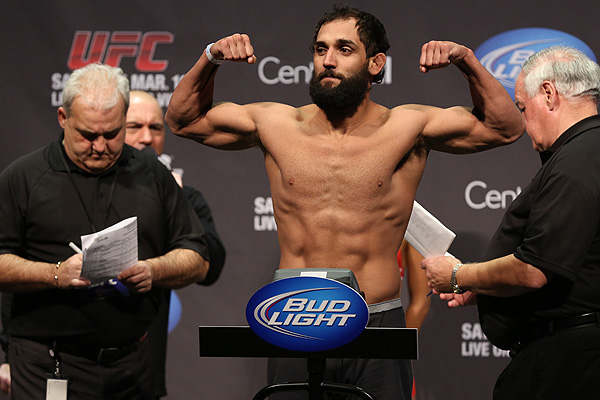Fight Medicine: The Boxers Fracture

Johny Hendricks could be sidelined by an injured hand. | Photo:
Dave Mandel/Sherdog.com
Johny Hendricks and Carlos Condit put on a show worthy of “Fight of the Night” honors in the UFC 158 co-main event on Saturday in Montreal.
Hendricks’ win came with a price, however, as the No. 1 contender at 170 pounds appeared to injure his left hand during the bout. He managed to continue fighting but will need to be examined by a doctor. It is quite possible Hendricks suffered a fracture of his small finger metacarpal, often called a “boxers fracture” since it is so common in the fight game.
Advertisement
Martial arts experts have long known that one of the safest punching methods involved a straight fist and hitting with the first two knuckles. This is a reference to striking with the MCP joints of the index and middle fingers. The reason: these bones are larger and more stable than the other metacarpal bones. Inadvertent striking with the small finger MCP due to poor technique, fatigue or looping punches can result in a fracture. The common occurrence of this injury in boxers led to its becoming known as the “boxers fracture.”
A fracture of the small finger or other metacarpal is usually angulated and should be X-rayed and realigned by a professional. Once realigned, it must be immobilized in a split or a cast to prevent the deformity from reoccurring. There may be a residual bump after the bone heals, but the function of the hand should not be compromised. However, if the alignment of the bone cannot be maintained, a surgeon may offer to hold it in place with hardware, which can include small screws, a plate and screws or removable pins that are poked through the skin and drilled into the bone. Residual angulation may lead to grip-strength weakness.
What does this mean for Hendricks and his shot against Ultimate Fighting Championship welterweight titleholder Georges St. Pierre? If he does have a metacarpal fracture, the hand will either require surgery or it will need to be kept in a cast for six weeks. If it is not healed after six weeks, then it will need to be placed back into the cast. One of the side effects of being immobilized in a cast is that the muscles begin to stiffen and contracts. That means you have to work with therapy to regain your hand strength and motion when you come out of the cast -- yet another setback. If you undergo surgery, you may be allowed to move your fingers earlier than you would with a cast, but you still have to wait for everything to heal. In such a case, you still cannot lift anything heavy or train with the hand for six to 12 weeks. The upside: because you can move your fingers earlier, there is less of a chance you will develop hand and finger stiffness.
Some people will point to the fact that Hendricks continued fighting against Condit as a sign he could compete again without treatment. In reality, he was caught up in the moment. He certainly does not want to worsen the injury and probably realized soon after his unanimous decision victory just how much it hurts.
Should Hendricks have a metacarpal fracture, he will be unable to punch or fully train for six to 12 weeks. If UFC President Dana White plans on booking St. Pierre-Hendricks, it appears as though he will have to wait a few months to do so.
Follow Jon “The Fight Doc” Gelber on Twitter at @FightMedicine or visit FightMedicine.net.
Related Articles







